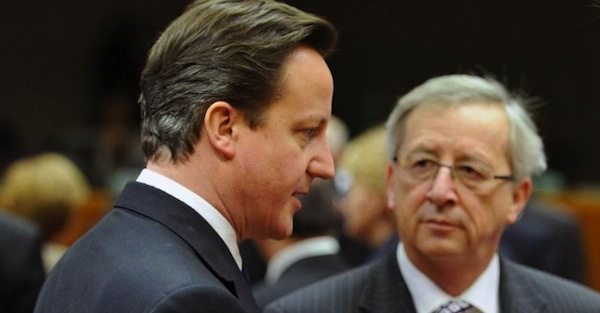
After the May elections to the European Parliament, the distance in seats between the European People’s Party and the social democrats significantly decreased in comparison to the previous term (from 78 to 30). This time, the EPP obtained 221 seats and the S&D 191, not to mention the latter won in popular vote. Given this result, one would have expected some battle for the candidature to chair the European Commission between the spitzenkandidaten of either group, Jean-Claude Juncker and Martin Schulz. However, this was not the case: from the beginning, all eyes were on the former Prime Minister of Luxembourg and the so called “battle” focused exclusively on his figure.
David Cameron‘s opposition to the candidature of Jean-Claude Juncker as President of the European Commission might have been expected (although nobody expected it to be quite as intense as it was), but the doubts Angela Merkel initially expressed in relation to this were completely unpredicted. In fact, the initial skepticism of the German Chancellor about Juncker contributed, to some extent, to the increase in the uncertainty about the possible existence of other unexpected contenders for the top job.
Even though the German Chancellor quickly changed course and expressed her support for the former Prime Minister of Luxembourg, there was a fierce campaign from the UK against him. Cameron himself warned repeatedly that Juncker “is a dangerous federalist” and even threatened on several occasions with the possibility of the United Kingdom leaving the European Union if Jean-Claude Juncker were to chair the European Commission. The English media have also fiercely attacked the EPP spitzenkandidat. So vicious was this attack against Juncker that influential tabloid newspapers such as ‘The Sun’ claimed that the candidate is ‘the most dangerous man in Europe’.
However, despite Cameron’s opposition, the European Council decided to propose Jean-Claude Juncker as the candidate to chair the European Commission. He was indeed chosen by a qualified majority, with 26 votes in favour and only two votes (those of Cameron and his Hungarian counterpart, Viktor Orban) against. The British Prime Minister, since he decided his party should leave the EPP in 2009, has lost influence and has been defeated and isolated in several battles: it happened previously with the ‘Fiscal Compact‘ in 2011, and has happened again with his fight against Juncker.
Still, the concerns of the UK have been taken into account by the European Council, which has agreed that they need to be addressed. Therefore, among other things, European leaders agreed that “the concept of ever closer union allows for different paths of integration for different countries, allowing those that want to deepen integration to move ahead, while respecting the wish of those who do not want to deepen any further”. The European Council also included among its conclusions Cameron’s will to review the process for the appointment of the President of the European Commission. These two ideas clearly responded to the concerns that the United Kingdom raised during the meeting.
In addition to the explicit aforementioned references to the UK, the European Council also made a few implicit references to the British concerns. The ideas that we must ‘take full advantage of the potential of the single market in all its dimensions’ or that ‘the Union must concentrate its efforts on those areas that can really make a difference’ are examples of these less explicit references. The latter, for example, is a clear allusion to the demands that the United Kingdom has regarding the subsidiarity principle as it has been understood so far in the Union.
However, despite his defeat in the fight against Juncker, the British Prime Minister has said that they can still work together to reform the EU. In fact, after Juncker’s nomination to chair the EC was confirmed, Cameron phoned to congratulate him and to discuss how they can make the Union more competitive and flexible. Juncker expressed his commitment to find solutions to the political concerns of the United Kingdom.
Therefore, we can see a clear attempt by the European Council to minimize damages and improve relations with the United Kingdom, aimed at reducing the risk of them leaving the Union (Cameron promised an in/out Referendum in 2017). The desire for flexibility manifested in the European Council’s conclusions after the summit on 26 and 27 June reflect this.

